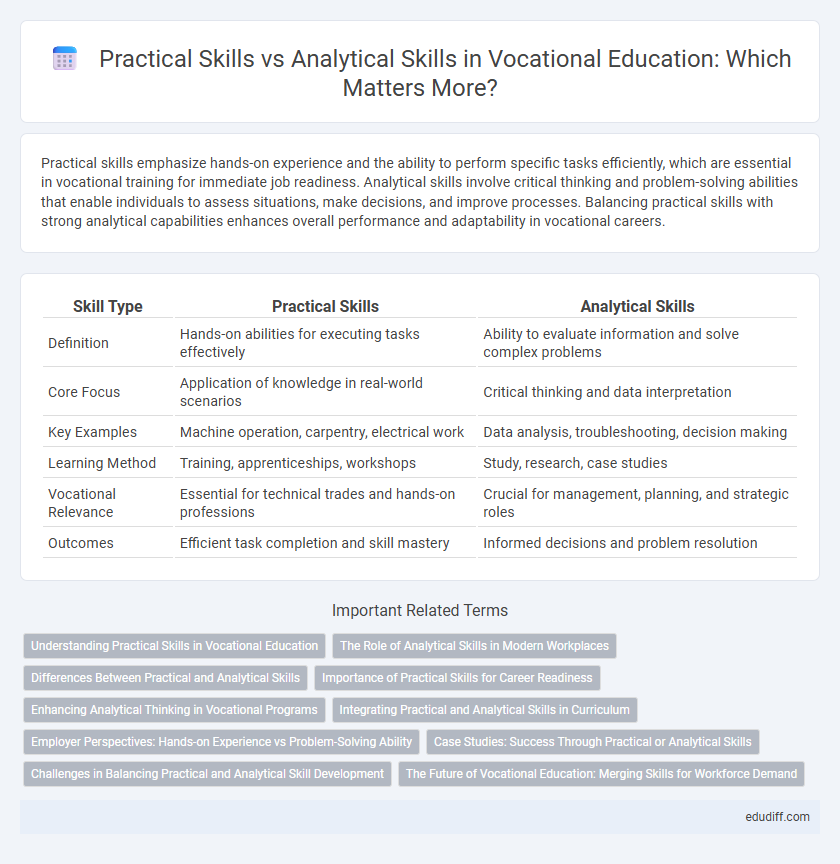Practical skills emphasize hands-on experience and the ability to perform specific tasks efficiently, which are essential in vocational training for immediate job readiness. Analytical skills involve critical thinking and problem-solving abilities that enable individuals to assess situations, make decisions, and improve processes. Balancing practical skills with strong analytical capabilities enhances overall performance and adaptability in vocational careers.
Table of Comparison
| Skill Type | Practical Skills | Analytical Skills |
|---|---|---|
| Definition | Hands-on abilities for executing tasks effectively | Ability to evaluate information and solve complex problems |
| Core Focus | Application of knowledge in real-world scenarios | Critical thinking and data interpretation |
| Key Examples | Machine operation, carpentry, electrical work | Data analysis, troubleshooting, decision making |
| Learning Method | Training, apprenticeships, workshops | Study, research, case studies |
| Vocational Relevance | Essential for technical trades and hands-on professions | Crucial for management, planning, and strategic roles |
| Outcomes | Efficient task completion and skill mastery | Informed decisions and problem resolution |
Understanding Practical Skills in Vocational Education
Practical skills in vocational education emphasize hands-on experience and task-specific competencies essential for job performance in fields such as plumbing, electrical work, and culinary arts. Mastery of these skills involves direct application of knowledge through workshops, simulations, and real-world practice, enhancing learner engagement and employability. Unlike analytical skills, practical skills foster immediate problem-solving capabilities and technical proficiency crucial for vocational success.
The Role of Analytical Skills in Modern Workplaces
Analytical skills enable employees to critically evaluate complex data, identify patterns, and solve problems efficiently, driving innovation and informed decision-making in modern workplaces. These skills complement practical abilities by providing a deeper understanding of underlying processes, enhancing overall job performance and adaptability. Employers prioritize analytical competence to improve strategic planning, optimize workflows, and maintain competitive advantage in rapidly evolving industries.
Differences Between Practical and Analytical Skills
Practical skills involve hands-on abilities that enable individuals to perform specific tasks efficiently, such as operating machinery, crafting, or technical troubleshooting. Analytical skills, on the other hand, focus on critical thinking, data interpretation, and problem-solving processes that help in decision-making and strategy development. The key difference lies in application: practical skills are action-oriented and tangible, whereas analytical skills are cognitive and involve evaluating information to derive insights.
Importance of Practical Skills for Career Readiness
Practical skills such as hands-on experience, problem-solving, and technical proficiency are essential for career readiness, enabling individuals to effectively perform job-specific tasks and adapt to workplace demands. Employers prioritize candidates with strong practical skills because these abilities drive productivity, reduce training time, and improve overall job performance. Integrating practical skills training in vocational education enhances employability by preparing students to meet real-world challenges confidently.
Enhancing Analytical Thinking in Vocational Programs
Vocational programs that integrate practical skills with analytical thinking foster stronger problem-solving abilities and adaptability in diverse work environments. Emphasizing analytical skill development through case studies, data interpretation, and critical reasoning exercises enhances decision-making quality and innovation potential. This balanced approach prepares students for complex vocational challenges, bridging hands-on expertise with cognitive agility.
Integrating Practical and Analytical Skills in Curriculum
Integrating practical and analytical skills in vocational curricula enhances students' ability to apply theoretical knowledge to real-world scenarios, fostering critical thinking alongside hands-on competence. Curriculum designs incorporating project-based learning, simulations, and case studies develop problem-solving skills while reinforcing technical expertise. This balanced approach prepares learners for dynamic job markets by promoting adaptability, innovation, and comprehensive skill sets essential for career success.
Employer Perspectives: Hands-on Experience vs Problem-Solving Ability
Employers in vocational fields highly value practical skills as they demonstrate hands-on experience directly applicable to job tasks, ensuring immediate productivity. Analytical skills, encompassing problem-solving ability, are essential for adapting to new challenges and optimizing workflows. A balanced combination of both skills equips candidates with the versatility needed to meet evolving industry demands effectively.
Case Studies: Success Through Practical or Analytical Skills
Case studies in vocational training reveal that success often hinges on a balanced integration of practical skills and analytical skills, with practical abilities enabling hands-on problem-solving and analytical skills fostering critical thinking and strategic planning. For instance, apprenticeships in fields like electrical engineering highlight how practical skills directly increase job performance and safety, while sectors such as data analytics demonstrate that strong analytical skills contribute to effective decision-making and innovation. Employers increasingly seek candidates who excel in applying theoretical knowledge through practical experience, reinforcing the value of combined skill sets for career advancement.
Challenges in Balancing Practical and Analytical Skill Development
Balancing practical skills and analytical skills development presents significant challenges in vocational training, as hands-on experience often demands immediate application, while analytical skills require deep critical thinking and reflection. Limited training time and resources restrict the integration of both skill sets, causing learners to excel in one area but lag in the other. Effective vocational programs must strategically design curricula that seamlessly combine experiential learning with problem-solving exercises to overcome this imbalance.
The Future of Vocational Education: Merging Skills for Workforce Demand
Vocational education is evolving to integrate practical skills, such as hands-on technical abilities, with analytical skills like problem-solving and data interpretation to meet future workforce demands. This fusion enhances adaptability, enabling workers to operate advanced machinery while analyzing performance metrics for continuous improvement. Employers increasingly seek candidates proficient in both domains, driving vocational programs to adopt interdisciplinary curricula that blend experiential learning with critical thinking development.
Practical Skills vs Analytical Skills Infographic

 edudiff.com
edudiff.com